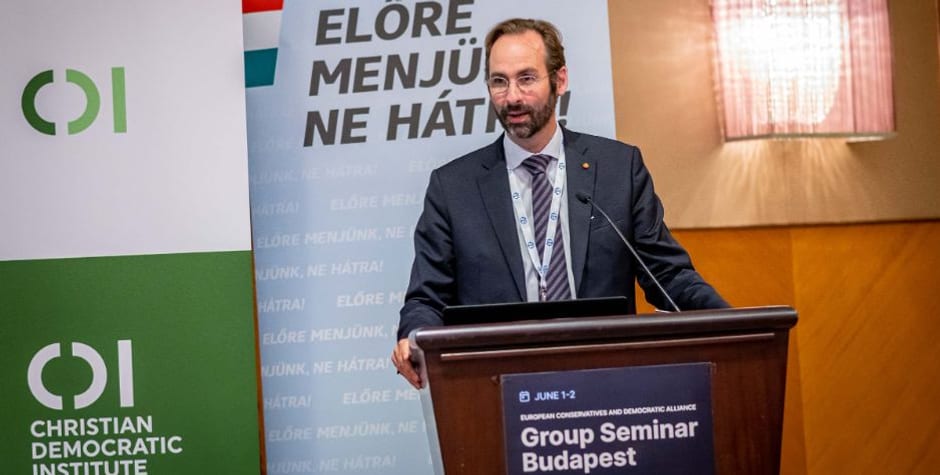

“Family Freedoms": A Response to the Attacks on Family in Europe
A Response to the Attacks on Family
Presentation given by Dr. Grégor Puppinck, Director General of the European Centre for Law and Justice, at the European Conservative Group & Democratic Alliance Group Seminar in Budapest, June 1st & 2d, 2023.
Madam Minister, Madam Secretary of State, dear members of parliament, ladies, and gentlemen, I am particularly pleased and honored to be with you today and to contribute to your reflections, which I hope will feed into your political action. The topic you asked me to discuss is extensive, so I will give you a brief overview.
My presentation will consist of prompt answers to four fundamental questions:
- Why destroy the family?
- Why defend the family?
- Against what threats?
- How can the family be defended?
If there is only one idea to take away from my speech, it is the concept of “family freedoms.” Families are natural human realities. Therefore, they possess natural needs and rights, and these rights can be encompassed comprehensively within the concept of “family freedoms.” This will be the conclusion of my presentation.
- So, the first question: why destroy the family?
I see four strong reasons:
- Because the family is contrary to the “equality” of individuals, both between families and within families;
- Because the family is contrary to the “freedom” of individuals, as it transmits cultural and religious determinisms and imposes biological ties;
- Because the destruction or weakening of the family contributes to economic growth, as it increases the number of people in economic activity, and it brings into the market activities previously performed within family circles for free;
- And, finally, because destroying or weakening the family strengthens the power of the State over individuals, as it artificially substitutes the families, especially in the education of children.
Thus, in the name of a certain conception of freedom and equality, the destruction or weakening of the family supports (short-term) economic growth and increases the (long-term) power of the State.
- So why defend the family?
Again, I see four reasons:
- Foremost, because the family is the first and principal place of human fulfillment; it is in the family that we are all born and learn to become human beings;
- Because the family is the place where life and heritage (both material and immaterial) transmit throughout generations;
- Because the family is the ultimate place of resilience in times of crisis.
- Because the family is the best antidote to individualism, egalitarianism, statism, and the commercialization of human relations. The family is also an antidote to ideologies because it is a natural reality governed by natural musts.
- Against what attacks should the family be defended?
The family is attacked at four constitutive levels:
- Attacks on the transmission of life, including the beauty of sexuality;
- Attacks on the physical unity of families, not only through the increase of divorce rates but also, more generally, because the members of the families spend less and less time together;
- Attacks on the transmission of the immaterial heritage of families (cultural and religious), in particular on the educational rights of the parents;
- Attacks on transmitting families' material heritage, through confiscatory taxation, especially on inheritance. We are all familiar with all these attacks; we know political forces support them.
- How can we defend families?
We can defend families by responding to these four levels of attack with measures aimed at strengthening family ties. Family ties are natural. So, it’s not a question of creating these ties but of protecting and encouraging them because they ultimately strengthen families and societies.
More generally, to defend and support families, we must have a proper understanding of the relationships between families, society, and the State. That is the key. It is on a proper understanding of these relationships that all family policy depends. The just family relationship originates from this factual observation: families predate the State. Families are the first forms of society, and together they make up national societies. States do not constitute families nor society, but the reverse: natural societies institute the State.
The family is the first natural human reality. Because the family is a natural human reality, it requires natural needs to flourish, i.e., to transmit life and immaterial and material heritage. The State must respect the family’s needs, which constitute natural rights. These natural rights have a name: “family freedoms.” This concept encompasses and comprehensively unifies the central freedoms every family needs to flourish. It is a conceptual vehicle - and political weapon - to promote and defend families, especially within liberal societies.
When the European Convention on Human Rights was drafted, three rights were grouped together in a single article under “family freedoms.” These are: the right to marry and found a family, the protection against arbitrary interference by the State into family life, and the right of parents to educate their children according to their moral and religious convictions. These are the three most basic components of the natural rights of families. These rights are now presented separately in articles 8 and 12 of the Convention and in article 2 of the first protocol. Through this choice, the European convention system has lost the vision of the family as a social reality with specific needs and a possessor of human rights. Instead favoring a purely individualistic approach to human rights. Finally, as you know, because of this individualistic approach, article 8 has now been turned against the families.
However, it is this natural understanding of the family and society that governed the drafting of the major declarations of human rights, as demonstrated by the fact that it is the family – and not the individual – that international law recognizes as “the natural and fundamental group unit of society” (UDHR, art.12), i.e., as a community that does not owe its existence to the State. Since then, numerous international texts, including those in Europe, have adhered to this natural description of the family. The family as “the natural environment for the growth and well-being of all its members and particularly children,” as described in the preamble of the Convention on the rights of the child, “is entitled to protection by society and the State;”[1] to ensure “an existence worthy of human dignity”[2] and to achieve “well-being.”[3] Man is not an abstract and isolated being but a living and social one. Persons are not just protected individually, nor even couples or sentiments, but the common good that they share with society is protected, which consists of the foundation of the family.
This is a natural and organic understanding of society, organized in a subsidiarity manner, which is especially visible in the field of education. According to the Universal Declaration of Human Rights, “Parents have, as a matter of priority, the right to choose the kind of education to be given to their children.” This priority is the expression of the precedence and superiority of the responsibility and rights of parents over those of society. The State must support families without taking the place of parents. This protection of families is exercised first and foremost against “arbitrary interference” by the State (ECHR, art. 12).
Most of the drafters of the Universal Declaration of Human Rights and the European Convention on Human Rights were perfectly aware of the essential and vital nature of families for society and that a flourishing society is based on flourishing families. But, confronted with communism and the recent fascisms, drafters of those texts were also aware that defending families is an effective way of combating ideologies and the authoritarian drift of the State.
So, I encourage you to use and diffuse the concept of “family freedoms” to answer, in a comprehensive manner, the challenges to traditional European family life.
***
[1] Universal Declaration of Human Rights, Article 16.3. Another sign of this subsidiary and organic comprehension of society is the distinction made between the state and society. In a society based on the social contact, there is no such distinction: society is entirely absorbed into the state and has no vital or previous existence of its own. This distinction implies that society existed before the state and that the state is therefore in the service of society.
[2] Article 23 § 3 of the Universal Declaration of Human Rights.
[3] Article 25 § 1 of the Universal Declaration of Human Rights.












